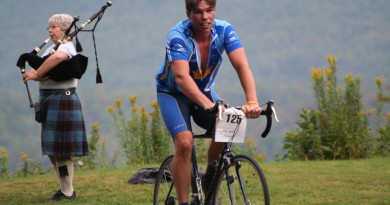The Accidental Heroine
By
Bill McCollom
Posted August 1st, 2007
All the awards and recognition that Kelly Brush has been receiving over the past fifteen months have been a bit baffling to her and at times overwhelming.
The Middlebury College senior from Charlotte has been the focus of multiple feature stories, as well as a TV highlight. Just this past June, the accolades continued when she was awarded the Mike Wilson Trophy by the Middlebury College Athletic Department and was named “Student of the Year” by the college newspaper.
“All this recognition certainly comes as a surprise to me,” said Kelly, who was busy wrapping up a summer school course and looking forward to a golf game later in the afternoon. “I’m humbled by all the attention, but really, I’m just doing what it seems I should be doing – going to school, playing sports, and seeing my friends.”
That may seem like the norm for most bright, talented, and cheery 20-year-olds, but as much as Kelly would like to be perceived as “the norm,” circumstances have conspired to thrust her into a different category.
In February of 2006, Kelly, a multi-sport athlete, who had attended a ski racing academy, was competing in the giant slalom for Middlebury College at the Williams College Carnival. A drop in temperature had turned the race-hill into a skating rink, a common condition for ski racers, but a small mistake spun Kelly around backwards, and when she fell on the frictionless surface, she slammed into a lift tower. The impact left her with a punctured lung, four cracked ribs, and a spinal fracture at T 7-8.
A few days later, her parents, Charlie and Mary, conveyed the grim news. “Kelly’s prognosis is unknown at this time, but all indications are that she will be in a wheelchair for the rest of her life.”
As soon as Kelly was stabilized, she was flown to Denver to start the rehabilitation process at the Craig Hospital, where she and her family groped for any sources of hope. The only certainty in their new lives was that things would never be the same. But they sensed that positivism and patience would be the keys to unlocking a productive future. One of Mary Brush’s journal entries read, “Once there [Craig Hospital] her life will become centered around what she can do in the future, not what she can’t do – doors opening, not closing – and that goes for the whole family.”
That declaration has continued to be the guiding force in their lives, and the doors have not stopped opening for Kelly. Whereas she still sees herself as a regular college kid, looking at her situation from the outside, it becomes apparent that this iron-willed Vermonter is anything but regular.
As soon as Kelly was well enough to sit up in her hospital bed, she started surfing the web. “I was looking for all the different things that I could to do with my injury – to see what’s out there. It’s nice to discover the size of the [disabled] community, if you can find it,” she says. When Kelly returned home from Craig Hospital in May, she wasted no time carving out her new
life – starting a foundation, enrolling in summer school, learning to drive, mastering a hand-driven bicycle, and preparing herself for the rigors of
independence that would be required once she started classes at Middlebury in the fall.
In the subsequent school year, there has been no letup. Kelly has carried a full academic load, helped with the ski team, and has added swimming, skiing, and golf to her repertoire.
Finding the wherewithal to start new activities can be daunting for anyone, but for one paralyzed from the chest down, the process can be excruciating. Patrick Standen, director of the Northeast Disabled Athletic Association, college professor and elite disabled athlete, notes, “Psychologically, it’s tough to engage in an active lifestyle after an injury of this nature. It requires a huge amount of will, particularly here in sparsely populated Vermont, where the support mechanisms are limited. And then there is the fear of failure that must be overcome. Failure is something disabled persons are keenly aware of since they tend to feel more self-conscious. It takes a community to buffer those feelings. Kelly is fortunate in that regard, having the support of her college, the ski team, and her family.”
But still, nothing comes easily, especially skiing. “The hardest thing is going back to a sport that I used to be an expert in, and then regressing to being a beginner,” Kelly says. “That’s the most frustrating. In order to keep going I have to think about the ultimate end product – gaining proficiency. You can’t care if you screw up or what other people might think, and that’s where a lot of people get stuck. You have to do it for yourself.”
Trying new sports or relearning old ones can be difficult, but there is a good reason why sports are part of every rehab regimen. In addition to the social interaction, physical gains, and rewards that come with accomplishment, sports for the disabled also offer a valuable form of catharsis. Standen notes, “While competing, you forget about all distractions in your life, and this is particularly important for disabled athletes.”
Para-Olympic ski racer Nick Catanzarite would be the first to agree. “Any time you see people walking around, you are aware of what’s been lost, but when I’m competing, my disability is the last thing on my mind.”
But even sports are no panacea. When asked in a TV interview if she has “recovered” from her injury, Kelly responded, “I’ll be recovering for the rest of my life. I don’t think I’ll ever come to terms with it, but that doesn’t mean I’m not in a good place.”
That “good place” for Kelly involves taking a few more courses over the summer in order to catch up with her graduating class, trying water skiing and sailing, and enjoying time with her family and friends, just like any other college student. “I really haven’t changed or anything,” said Kelly. “It’s just that I don’t want my injury to be a hindrance – I want to graduate with my friends and be as active as possible.”


